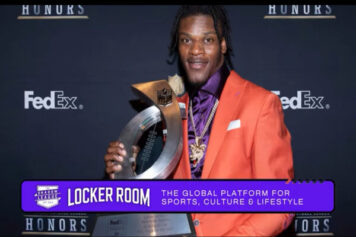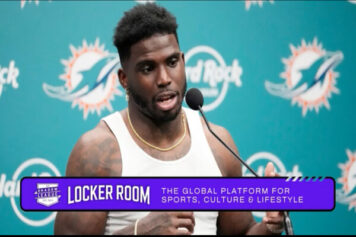We sat down with Diahann Billings-Burford to discuss her new role as CEO of RISE, mentorship and activism through sports.
Sports has increasingly become another medium for empowerment and activism. Organizations like RISE (Ross Initiative in Sports for Equality) are working tirelessly to educate communities on topics such as race and injustices.
Founded in 2015, RISE is a national nonprofit that educates and empowers the sports community to eliminate racial discrimination, champion social justice and improve race relations. Through partnerships and programs, RISE inspires leaders in sports to create positive change on matters of race and equality.
The Shadow League recently down with Diahann Billings-Burford to talk about her new role as CEO of RISE, mentorship, and activism through sports.
***
The Shadow League: Can you tell me a little bit more about RISE and its mission?
Diahann Billings-Burford: We actually have been working fairly hard over the past six months to really refine our mission and to really make sure that our work and mission is aligned at all times possible. Our mission really is to educate and empower people in the sports community.
And we think that means a lot of people. We are not limited to professional athletes or collegiate athletes, but we’re really using the power of sports to combat racial injustice and social injustice.
And so, our work is about doing that. You do that multiple ways but primarily you do it through educating at all levels. From all levels from high school, college and adult.
We do it by empowering those people as well. Kind of be in that space and understand issues of race and identity, and identify racial discrimination and combat it.
TSL: What are some like the biggest challenges/obstacles that you’ve come across trying to spread your organization’s message?
DBB: I think hands down the biggest challenge is racism in and of itself. You know one of the things we say to people is racism is complex. And in this country and most places it’s complex and it’s entrenched. And it’s uncomfortable.
There is nothing comfortable about talking about race. Especially not the conversations we’re trying to have with people of different races, talking about it together. You know, one of the reasons that I was attracted and took this job was I thought of a piece that we have up on the website of Steve Ross talking about his experience as a teenager.
Going from Detroit, seeing white flight, and his family moving to Florida. For the first time as a teenager seeing segregation. you know and so one of the things that attracted me to coming here and working was seeing that.
Racism is a difficult subject but to be able to work a place with someone who is white and who understands right, like this is a subject we don’t even want to talk about, but if we don’t talk about it, we’re not going to get better.
So I think our largest challenge is the core of what we are trying to get at what we want to do. It is easy for people to engage us and want to have a different conversation besides that one, I would say that’s our biggest challenge.
And then I think our other challenge is because it is so difficult. I do think there’s people that want to get on board and they’re just nervous about it or they don’t know how.
I would say we do work quite a bit with professional athletes, and I find most of them incredibly sensitive too. They don’t want to use their platform in a way that’s sensational but will not help others but will hurt others. And I love that they have that understanding and have that sensitivity.
TSL: Colin Kaepernick sacrificed his career to bring awareness to racial injustice. What is some advice that you might have for younger people or just people in general who might want to get involved in activism but are afraid to take that step?
DBB: I think what it is best for all of us is to act out of purpose not out of fear.
It is a difficult thing to do. It sounds simple but it is difficult because fear looks like concern for your future. Concern for how you’re going to make money. Concern for what feathers you’re going to ruffle.
But I just encourage everyone, we have one life. You’ve got to act out of purpose and not fear. And I think if you go down that road it’s hell. It is your own guide about when to be an activist and when not because you win when you’re doing what aligns with your purpose.
Really act out of purpose and not fear and I understand that sometimes that does mean there is going to be a sacrifice. Two weeks ago in Atlanta, as a leading part of the athlete advocacy workshop, we had athletes from the NFL, USA Track and Field and WNBA, really taking them to a curriculum with three days to help them on this track.
But a lot of it is like identifying with yourself and identifying with your purpose so that when you’re deciding to be an activist, it makes sense for you. And sometimes, that does mean sacrifice.
TSL: Can you give us a detailed description of some of the activities that you do or some of the workshops that take place with RISE?
We have mostly centered around identity, diversity, inclusion, and activism all relating to our mission.
To give you some specificity it could be that we are doing the same or similar activities with various audiences. It’s been adjusted for age. We could be doing an activity focused on identity. We do that quite a lot at our base to focus on identity with the individual and we’ll dig down and we’ll talk about it.
There is an external identity marker that we all look to go by, but then there are internal ones that people cannot see that are very much a part of who each of us is.
And giving people the time to reflect on that. Figure that out, identify that and unpack that for themselves. So you might have an activity like that, we have quite a few that really touched on that issue.
And quite honestly since I’ve been here, I’ve been dealing with law enforcement officers and high schoolers in Detroit together. And I’ve seen us do it with NFL executives and retired players. We’ll have activities like that but we’ll have activities focused on team building. We have activities that are in some ways quite academic.
Leading to discussions like, “Let’s talk about the difference between equality and equity.” And again we’re having those conversations at all different levels and trying our best to have it but that need to be brought together.
***
Billings-Burford one of the newest role models for Career Girls. Career Girls is a San Francisco-based non-profit organization that got its start in 1996 and is dedicated to helping every girl around the world reach her full potential and discover her own path to empowerment by providing access to real women role models and a supportive, girl-centric curriculum to learn from.





